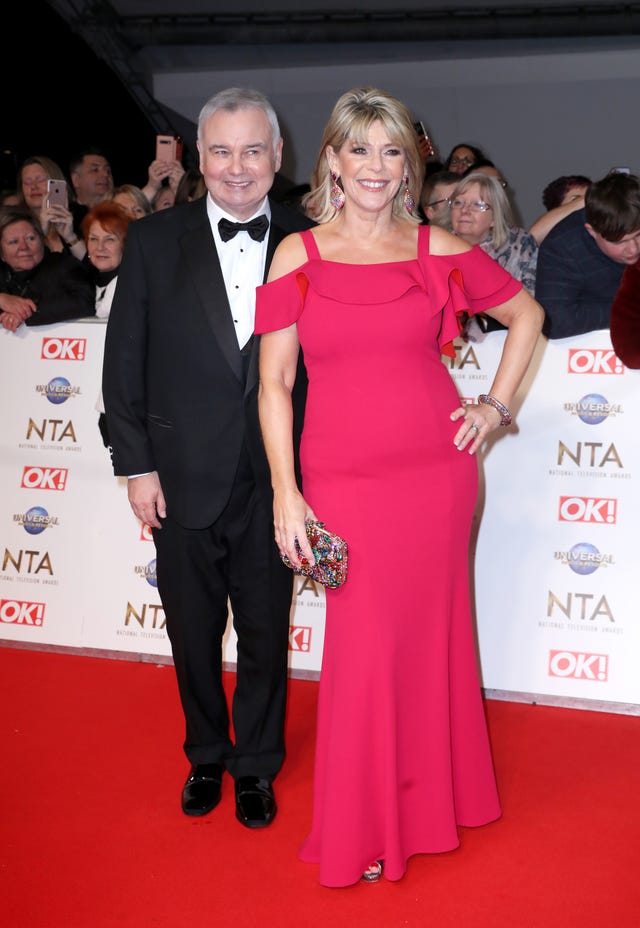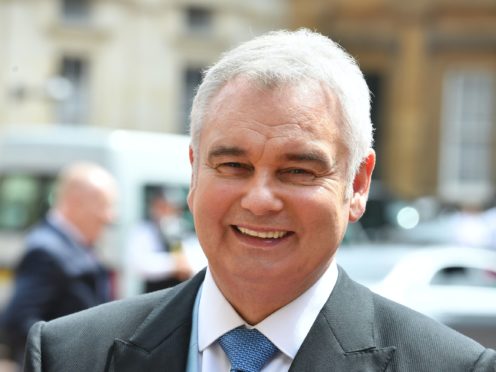Eamonn Holmes has attempted to “clarify” his comments on 5G technology and coronavirus – as Ofcom said it would urgently assess hundreds of complaints about his remarks.
The presenter told viewers of This Morning, where he made the original comments, that he had agreed the conspiracy theories are not true.
The 60-year-old said there is “no scientific evidence to substantiate any 5G theories” but did not apologise and said he had been “misinterpreted”.
He told viewers: “I want to clarify some comments that some of you may have misinterpreted from me yesterday, around conspiracy theories and coronavirus, and this involved the rollout of 5G.

“Both Alice Beer and myself agreed in a discussion on this very programme on fake news that it’s not true and there is no connection between the present national health emergency and 5G and to suggest otherwise would be wrong and indeed it could be possibly dangerous.
“Every theory relating to such a connection has been proven to be false and we would like to emphasise that.
“However, many people are rightly concerned and looking for answers and that’s simply what I was trying to do, to impart yesterday.
“But for the avoidance of any doubt I want to make it clear there’s no scientific evidence to substantiate any of those 5G theories. I hope that clears that up now.”
His comments sparked 419 complaints, which TV watchdog Ofcom said it will assess as a “priority”.
A spokeswoman for the regulator told the PA news agency: “We are assessing this programme in full as a priority.”
Holmes weighed in on the ITV show after presenter Beer branded the conspiracy theories “ridiculous” and “incredibly stupid”.
So I’ve just heard #ThisMorning presenter Eammon Holmes legitimise the stories linking the Coronavirus lockdown to 5G. On national television. Wow. How irresponsible can you get. Switching off. Hope Holly & Phil are back soon.
— vickster51 (@vickster51) April 13, 2020
The broadcaster, who was co-presenting with wife Ruth Langsford, responded that “it’s very easy to say it is not true because it suits the state narrative”.
He told Beer: “I totally agree with everything you are saying but what I don’t accept is mainstream media immediately slapping that down as not true when they don’t know it’s not true.
“No-one should attack or damage or do anything like that but it’s very easy to say it is not true because it suits the state narrative.”
The presenter added: “That’s all I would say, as someone with an inquiring mind.”
Experts have previously dismissed any link, calling it a “physical and biological impossibility” and branding “conspiracy theorists … a public health danger”.
Scientists criticised his comments.
Professor Brendan Wren, professor of microbial pathogenesis at the London School of Hygiene & Tropical Medicine, said: “I welcome inquiring minds, but this needs to be based on some fact and not pedalled as a conspiracy as this causes untold damage.”
Does @EamonnHolmes believe the RIDICULOUS 5G conspiracy?! #thismorning @_alicebeer indulging him far too much with her reply.
— Johnson McJohnson (@jimmyma42227225) April 13, 2020
Dr Michael Head, senior research fellow in global health at the University of Southampton, said: “Holmes is not known for his scientific expertise and appears to have very little in the way of relevant qualifications, experience or any kind of written track record in peer-reviewed journals.”
Dr Simon Clarke, associate professor in cellular microbiology at the University of Reading, said the idea that Covid-19 is caused by 5G mobile signals is “complete rubbish”.
A spokesman for Mobile UK, a trade association for UK mobile network operators, said, after Holmes attempted to clarify his comments,that “careless talk” could have repercussions.
“Theories being spread about 5G are baseless and are not grounded in credible scientific theory, ” the spokesman said.
“Mobile operators are dedicated to keeping the UK connected, and careless talk could cause untold damage.
“Continuing attacks on mobile infrastructure risks lives and, at this challenging time, the UK’s critical sectors must be able to focus all their efforts on fighting this pandemic.”
Downing Street would not respond directly to Holmes’ comments but said the 5G conspiracy theory is “complete nonsense”.
The Prime Minister’s official spokesman said: “I don’t have a specific reaction to Eamonn Holmes but I think I have said in the past that the claims are complete nonsense and we have been working with social media companies to ensure that these entirely bogus claims are not circulated.”
Viewers also criticised the presenter’s comments and accused him of “legitimising” the conspiracy theories.
#thismorning well done Eamonn. You just added more fuel to this 5G conspiracy theory by legitimising what is utter nonsense. You need to research properly before pronouncing
— Andy Green (@EI3HG) April 13, 2020
Holmes made the remarks after MPs called for social media companies to be held to account following reports of phone masts being attacked after theories spread online.
Ofcom is also assessing comments made by David Icke about coronavirus, in an interview on London Live.
Conspiracy theorist Icke supported Holmes, writing on Twitter: “Eamonn Holmes hammered here by the morons who don’t have a thought in their head that the system hasn’t put there – free speech and don’t believe the mainstream media is controversial? Go back to sleep people – Oh, sorry, you already have.”
Ofcom previously ruled that a local radio station had breached its rules after one of its guests suggested the Covid-19 outbreak was caused by the rollout of 5G mobile technology.
ITV declined to comment.
